#Labor Relations
Explore tagged Tumblr posts
Text
saw the post and didn't comment at the time, but you know what you do with a surplus of cucumbers?
you feed your surplus cucumbers to your pigs or goats, and then you slaughter your animals when there isn't a surplus of food.
The workplace phenomenon of union labor shoving cucumbers through managers' mail slots is because of a failure to integrate the whole diversity of farming into backyard grow operations. Of course you have a surplus! You built a machine to generate organic materials and you didn't scale up your organic materials processing to match!
9 notes
·
View notes
Note
Would you say covid is having a black plague style effect with the rise of more militant labor leadership, or are there any other factors playing a role?
Not really, no.
I think the fundamental change has been a longer-term post-Great Recession tightening of the labor market that started around 2016 and (with the exception of a brief blip during the lockdown) has continued to the present, along with even longer-term changes in public attitudes about unions and inequality.

I would argue that the changes in union leadership and the increases in strikes and organizing drives we've seen recently are essentially a lagging response to that shift in worker leverage vis-a-vis the bosses.

#u.s politics#labor#trade unions#union movement#labor history#labor law#labor unions#labor relations#labor studies
26 notes
·
View notes
Text
if you work 40 hours a week you deserve a gundam
“if you’re working a full time job you should be able to afford to live on your own and have access to food and transportation” gonna be real with you brother. everyone deserves this. Not just people working 40 hrs a week
71K notes
·
View notes
Text
Lessons of the Triangle Shirtwaist Factory Fire
March 25, 1911 was the date of the Triangle Shirtwaist Factory Fire. We marked the centennial a few years ago here on Travalanche, along with the fact that there was an off-Broadway play up about it at the time. This year we have timely and terrifying reason to bring it up again. It’s not a complicated story. The place was a garment factory, located on the top three floors of a ten story…
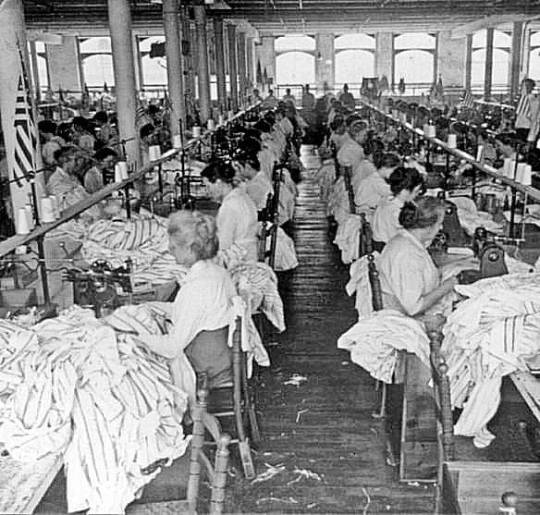
View On WordPress
1 note
·
View note
Text
Former Tata Steel VP Meets Tata Workers’ Union Leaders
Suresh Dutt Tripathi Visits Tata Workers’ Union Office Retired executive commends union’s achievements during cordial meeting with officials. JAMSHEDPUR – Suresh Dutt Tripathi, former Vice President (HRM) of Tata Steel, paid a visit to the Tata Workers’ Union office, engaging with key union officials in a friendly gathering. The meeting brought together prominent union leaders, including…

View On WordPress
#बिजनेस#business#corporate-union interaction#employee representation#industrial relations#Jamshedpur industry#labor relations#Sanjeev Kumar Choudhary#Suresh Dutt Tripathi#Tata Steel#Tata Workers&039; Union#union leadership
0 notes
Text
Friday Feature: You Will be Hated
TGIF! I found this piece on LinkedIn and thought it was quite good and worthy of reposting in its entirety. I know what this is about, personally. I was an administrator, moreover, a senior living and healthcare CEO for many, many years. I ran large organizations primarily but the parallels within this story, don’t change. At times, I was hated for doing the work I had to do and, in some cases,…
View On WordPress
#accountability#administrators#care#Decision Making#families#Friday Feature#Industry Outlook#insight#Labor Relations#Leadership#LinkedIn#Management#management theory#NHAs#Nursing Homes#Quality#resident relations#residents#Staff#Strategy
0 notes
Text
The billionaire class has forgotten we outnumber them.

tbh it seems like they want us to bring it back
9K notes
·
View notes
Text
All bets are off
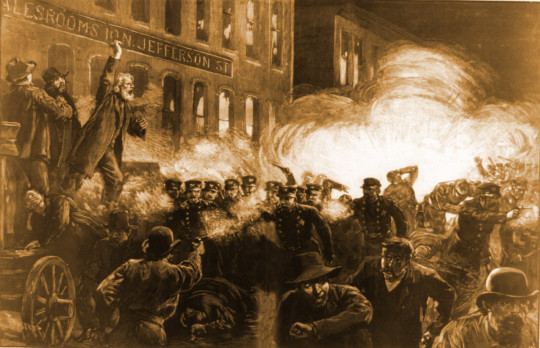
When unions are outlawed, only outlaws will have unions. Unions don't owe their existence to labor laws that protect organizing activities. Rather, labor laws exist because once-illegal unions were formed in the teeth of violent suppression, and those unions demanded – and got – labor law.
Bosses have hated unions since the start, and they've really hated laws protecting workers. Dress this up in whatever self-serving rationale you want – "the freedom to contract," or "meritocracy" – it all cashes out to this: when workers bargain collectively, value that would otherwise go to investors and executives goes to the workers.
I'm not just talking about wages here, either. If an employer is forced – by a union, or by a labor law that only exists because of union militancy – to operate a safe workplace, they have to spend money on things like fire suppression, PPE, and paid breaks to avoid repetitive strain injuries. In the absence of some force that corrals bosses into providing these safety measures, they can use that money to pay themselves, and externalize the cost of on-the-job injuries to their workers.
The cost and price of a good or service is the tangible expression of power. It is a matter of politics, not economics. If consumer protection agencies demand that companies provide safe, well-manufactured goods, if there are prohibitions on price-fixing and profiteering, then value shifts from the corporation to its customers.
Now, if labor has few rights and consumers have many rights, then bosses can pass their consumer-side losses on to their workers. This is the Walmart story, the Amazon story: cheap goods paid for with low wages and dangerous working conditions. Likewise, if consumer rights are weak but labor rights are strong, then bosses can pass their costs onto their customers, continuing to take high profits by charging more. This is the story of local gig-work ordinances like NYC's, which guaranteed a minimum wage to delivery drivers – restaurateurs responded by demanding the right to add a surcharge to their bills:
https://table.skift.com/2018/06/22/nyc-surcharge-debate/
But if labor and consumer groups act in solidarity, then they can operate as a bloc and bosses and investors have to eat shit. Back in 2017, the pilots' union for American Airlines forced their bosses into a raise. Wall Street freaked out and tanked AA's stock. Analysts for big banks were outraged. Citi's Kevin Crissey summed up the situation perfectly, in a fuming memo: "This is frustrating. Labor is being paid first again. Shareholders get leftovers":
https://www.vox.com/new-money/2017/4/29/15471634/american-airlines-raise
Limiting the wealth of the investor class also limits their power, because money translates pretty directly into political power. This sets up a virtuous cycle: the less money the investor class has to spend on political projects, the more space there is for consumer- and labor-protection laws to be enacted and enforced. As labor and consumer law gets more stringent, the share of the national income going to people who make things, and people who use the things they make, goes up – and the share going to people who own things goes down.
Seen this way, it's obvious that prices and wages are a political matter, not an "economic" one. Orthodox economists maintain the pretense that they practice a kind of physics of money, discovering the "natural," "empirical" way that prices and wages move. They dress this up with mumbo-jumbo like the "efficient market hypothesis," "price discovery," "public choice," and that old favorite, "trickle-down theory." Strip away the doublespeak and it boils down to this: "Actually, your boss is right. He does deserve more of the value than you do":
https://pluralistic.net/2024/09/09/low-wage-100/#executive-excess
Even if you've been suckered by the lie that bosses have a legal "fiduciary duty" to maximize shareholder returns (this is a myth, by the way – no such law exists), it doesn't follow that customers or workers share that fiduciary duty. As a customer, you are not legally obliged to arrange your affairs to maximize the dividends paid by to investors in your corporate landlord or by the merchants you patronize. As a worker, you are under no legal obligation to consider shareholders' interests when you bargain for wages, benefits and working conditions.
The "fiduciary duty" lie is another instance of politics masquerading as economics: even if bosses bargain for as big a slice of the pie as they can get, the size of that slice is determined by the relative power of bosses, customers and workers.
This is why bosses hate unions. It's why the scab presidency of Donald Trump has waged all-out war on unions. Trump just effectively shuttered the National Labor Relations Board, unilaterally halting its enforcement actions and investigations. He also illegally fired one of the Democratic NLRB board members, leaving the agency with too few board members to take any new actions, meaning that no unions can be recognized – indeed, the NLRB can't do anything – for the foreseeable future:
https://www.npr.org/2025/01/28/nx-s1-5277103/nlrb-trump-wilcox-abruzzo-democrats-labor
Trump also fired the NLRB's outstanding General Counsel, Jennifer Abruzzo, who was one of the stars of the Biden administration, who promulgated rules that decisively tilted the balance in favor of labor:
https://pluralistic.net/2023/09/06/goons-ginks-and-company-finks/#if-blood-be-the-price-of-your-cursed-wealth
Trump is playing Grinch here – he's descended upon Whoville to take all the Christmas decorations, in the belief that these are the source of Christmas. But the Grinch was wrong (and so is Trump): Christmas was in the heart of the Whos, and the tinsel and baubles were the expression of that Christmas spirit. Likewise, labor rights come from labor organizing, not the other way around.
Labor rights were enshrined in federal law in 1935, with the National Labor Relations Act. Bosses hated – and hate – the NLRA. 12 years later, they passed the Taft-Hartley Act, which substantially gutted the NLRA. Most notably, Taft-Hartley bans "sympathy strikes" – when unions walk out in support of one another. Sympathy strikes are a hugely powerful way for workers to claim value away from bosses and investors, which is why bosses got rid of them.
But even then, bosses who were honest with themselves would admit that they preferred life under the NLRA to life before it. Remember: labor militancy created the NLRA, not the other way around. When workers didn't have the legal means to organize, they organized by illegal means. When they didn't have legal ways of striking, they struck illegally. The result was pitched battles, even bloodbaths, as cops beat and even killed labor organizers. Bosses hired thugs who committed mass murder – literally. In 1913, strikebreakers working for the Calumet and Hecla Mining Company started a stampede during a union Christmas party that killed 73 people, including many copper miners' children:
https://en.wikipedia.org/wiki/Italian_Hall_disaster
Workers didn't take this lying down. Violence was met with violence. Bombs went off outside factories and stately mansions. There was gunfire and arson. Bosses had to hire armed guards to escort them as they scurried between their estates and their fancy parties and their executive offices. The country was in a state of near-perpetual chaos.
The NLRA created a set of rules for labor/boss negotiations – rules that helped workers claim a bigger slice of the pie without blood in the streets. But the NLRA also had benefits for bosses: unions were obliged to play by its rules, if they wanted to reap its benefits. The NLRA didn't just put a ceiling over boss power – it also put a ceiling over worker militancy. Von Clausewitz says that "war is politics by other means," which implies that politics are war by other means. The alternative to politics isn't capitulation, it's war.
Trump has torn up the rules to the labor game, but that doesn't mean the game ends. That just means there are no rules.
The labor movement has many great organizer/writers, but few can match the incredible Jane McAlevey, who died of cancer last summer (rest in power). In her classic A Collective Bargain, McAlevey describes her organizer training, from a tradition that went back to the days before the National Labor Relations Act:
https://pluralistic.net/2023/04/23/a-collective-bargain/
McAlevey was very clear that labor law owes its existence to union power, not the other way around. She explains very clearly that union organizers invented labor law after they invented unions, and that unions can (and indeed, must) exist separately from government agencies that are charged with protecting labor law. But she goes farther: in Collective Bargain, McAlevey describes how the 2019 LA Teachers' Strike didn't just win all the wage and benefits demands of the teachers, but also got the school district to promise to put a park or playground near every school in the system, and got a ban on ICE agents harassing parents at the school gates.
This wildly successful strike forged bonds among teachers, and between teachers and their communities. These teachers went on to run a political get-out-the-vote campaign in the 2020 elections and elected two Democratic reps to Congress and secured the Dems' majority. McAlevey contrasted the active way good unions involve workers as participants with the thin, anemic way that the Democratic Party engages with supporters – solely by asking them for money in a stream of frothing, clickbait text messages. As McAlevey wrote, "Workplace democracy is a training ground for true national democracy."
Militant labor doesn't just protect labor rights – it protects human rights. Remember: MLK, Jr was assassinated while campaigning for union janitors in Memphis. LA teachers ended ICE sweeps at the school gates. Librarian unions are leading the fight against book bans.
The good news is that public opinion has swung wildly in favor of unions over the past decade. More people want to join unions than at any time in generations. More people support unions that at any time in generations.
The bad news is that union leadership fucking suuuuuuuucks. As Hamilton Nolan writes, union bosses are sitting on vast, heretofore unseen warchests of cash, and they just experienced a four-year period of governmental support for unions unheard of since the Carter administration, and they did fuck all with that opportunity:
https://www.hamiltonnolan.com/p/confirmed-unions-squandered-the-biden
Big unions have effectively stopped trying to organize new workers, even when workers beg them for help forming a union. Union organizing budgets are so small as to be indistinguishable from zero. Despite the record number of workers who want to be in a union, the number of workers who are in a union actually fell during the Biden years.
Indeed, some union bosses actually campaigned for Trump, a notorious scab. Teamsters boss Sean O'Brien spoke at the fucking RNC, a political favor that Trump repaid by killing the NLRB and every labor enforcement action and investigation in the country. Nice one, O'Brien. See you in hell:
https://www.theatlantic.com/politics/archive/2024/08/teamster-union-trump/679513/
Union bosses squandered a historical opportunity to build countervailing power. Now, Trump's stormtroopers are rounding up workers with the goal of illegally deporting them. Fascism is on the rise. Labor and fascism are archenemies. Organized labor has always been the biggest threat to fascism, every time it has reared its head. That's why fascists target unions first. Union bosses cost us an organized force that could effectively defend our friends and neighbors from Trump's deportation stormtroopers:
https://prospect.org/blogs-and-newsletters/tap/2025-01-28-trumps-lawbreaking-also-aimed-at-workers/
Not every union boss is a scab like O'Brien. Shawn Fain, head of the UAW, won an historic strike against all three of the Big Three automakers, and made sure that the new contracts all ran out in 2028, and called on other unions to do the same, so that the country could have a general strike in 2028 without violating the Taft-Hartley Act (Fain was operating on the now-dead assumption that unions had to play by the rules):
https://pluralistic.net/2024/11/11/rip-jane-mcalevey/#organize
A general strike isn't just a strike for workers' rights. Under Trump, a general strike is a strike against Trumpism and all its horrors: kids in cages, forced birth, trans erasure, climate accelerationism – the whole fucking thing.
A general strike would build the worker power to occupy the Democratic Party and force it to stand up for the American people against oligarchy, rather than meekly capitulating to fascism (and fundraising), which is all they know how to do anymore:
https://pluralistic.net/2025/01/10/smoke-filled-room-where-it-happens/#dinosaurs
But before we can occupy the Dems, we have to occupy the unions. We need union bosses who are committed to signing up every worker who wants workplace democracy, and unionizing every workplace in spite of the NLRB, not with its help. We need to go back to our roots, when there were no rules.
That's the world Trump made. We need to make him regret that decision.

If you'd like an essay-formatted version of this post to read or share, here's a link to it on pluralistic.net, my surveillance-free, ad-free, tracker-free blog:
https://pluralistic.net/2025/01/29/which-side-are-you-on/#strike-three-yer-out
#pluralistic#labor#nlra#nlrb#jennifer abruzzo#national labor relations board#national labor relations act#unions#organize#general strike#general strike 2028
3K notes
·
View notes
Text
Mexico accepts the US review request on alleged labor rights denial at Autoliv Steering Wheels. Committed to enforcing T-MEC provisions, a 35-day internal review by the Ministry of Labor will follow. Crucial moment for international labor relations.
0 notes
Text
NLRB Says Companies That Union-Bust Must Recognize Busted Union
Image: rafapress (Shutterstock) The union push of the 2020s is gaining more momentum, this time from the National Labor Relations Board. New guidelines from the NLRB say that if a company opts to bust a union, that company will be forced by the Board to recognize the union. This Giant Company Owns Almost Every Dating App The NLRB announced the new framework as part of a decision in the case…
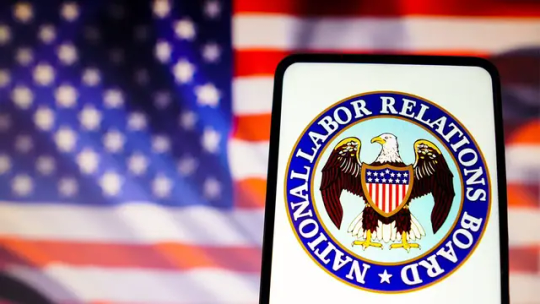
View On WordPress
#Cemex Construction Materials Pacific LLC#Gizmodo#Labor#Labor relations#Lauren McFerran#National Labor Relations Board#NLRB election procedures#The Blue Eagle at Work#Trade unions#Union busting#United States labor law
0 notes
Text
I get that these shifts don’t work for everyone and more than 12 hrs should definitely be illegal in all but catastrophic emergencies. However I requested a 7 on 7 off schedule that requires 12 hr shifts to work. And this is better for me and the coworker that works opposite of me.
There is also the fact that in medical settings pass off at shift change is responsible for a large percentage of mistakes. That’s one reason 12 hr shifts is so common. So there are non-evil reasons to have 12 hr schedules. Not so much on forcing people to regularly do doubles. That’s not on.
Fucking hell why are we making people in hospitals who are responsible for the health and wellbeing of everyone work 12 hour shifts with no breaks I feel like I'm going insane does no one else see the problem here??
29K notes
·
View notes
Text
nothing makes me more insane than the phrase "selling your body" btw. like was i not also selling my body at every other job i've had where i had to be on my feet all day, lifting boxes, working in a warehouse, etc. why is it that sex work is uniquely labeled as "selling your body" while every other job is sorted into another category, no matter how much that job might have a physical impact on your body. lmao.
#personal#sw#in fact i have had worse long term physical effects from my jobs that were not sw. as a matter of fact#anyway also related conversation to be had about how most of the human trafficking in the US is not sex trafficking but is in fact other#types of labor that is trafficked#and that if you include prison labor as human trafficking based on different definitions. there is a lot of important connections we can dr#draw. about labor. power. control. and how to build solidarity to actually fight for people's right to free + safe working conditions and#self determination
11K notes
·
View notes
Text
Companies That Union-Bust Must Now Automatically Recognize Union, NLRB Rules
The National Labor Relations Board issued a ruling on Friday that changes the framework for unionizations, making it easier for workers to organize and harder for companies to fight back against them. The new process comes as part of a decision in the case between Cemex Construction Materials Pacific, LLC and the International Brotherhood of Teamsters, where the Board found that the employer had committed over 20 “instances of objectionable or unlawful misconduct” between the filing of the union election petition and the election itself, intending to dissuade workers from organizing.
#NLRB#national labor relations board#union#labor unions#union strong#union busting#cemex construction materials pacific#teamsters#international brotherhood of teamsters#teamsters union
3K notes
·
View notes
Text
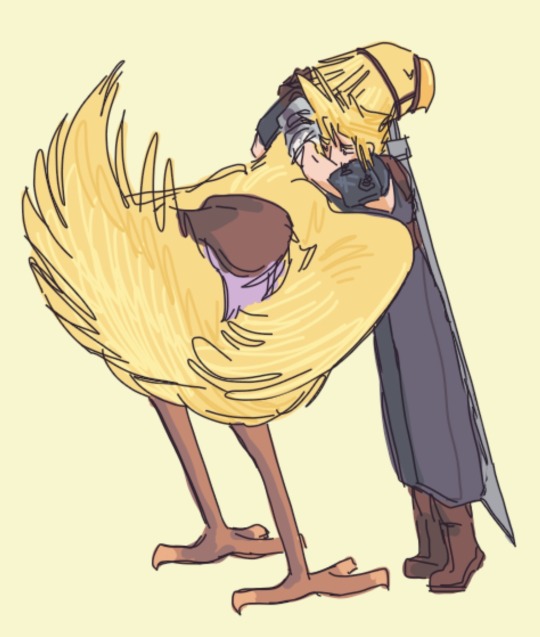
we got a lot in common...
#everyone knows that cloud is a horse girl. but have you considered:#cloud who's had a really hard time making friends and relating to people his whole life#and then he realizes that chocobos are the only thing that comes naturally to him.#chocobo warks and flaps its wings and cloud warks back and flaps his arms. yknow.#how hard it is for him to have to leave the birds behind and go back to being around people and doing responsible human things#when really all he wants is to feel like he belongs.#chocobos don't demand favors and emotional labor. they don't care if cloud doesn't smile much or have anything to say. they love him anyway.#(it's the autism. if that wasn't obvious)#(it's cloud autism strife.)#(it's also possibly me projecting HARD. whoopsie daisy)#ahem. anyway#ffvii#cloud strife#chocobo#my art <3
869 notes
·
View notes
Text
A little louder for all the smug Europeans at the back saying, "Why do Americans just accept poor working conditions?" Because sometimes our literal lives depend on it.

Facebook deleted this almost immediately. It's almost like the ultrawealthy don't want us knowing or talking about what's at stake.
82K notes
·
View notes
Text
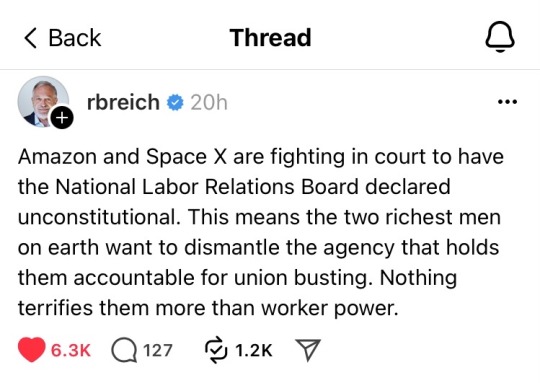
#threads#threads app#current events#social justice#human rights#important#political#political posting#politics#workers rights#late stage capitalism#capitalism#anti capitalism#national labor relations board#unions#union#labor unions#us politics#usa politics#american politics#united states politics
868 notes
·
View notes